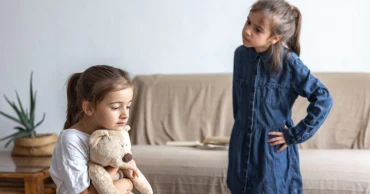Child safety
Fire Safety Tips for Parents to Keep Children Safe
Fires can be devastating, but with the right knowledge and precaution, parents can significantly reduce the risk to their children. Whether it's in the home, at school, or during family outings, understanding and implementing fire safety measures can make all the difference. In this guide, we will explore essential fire safety tips for parents to keep their children safe.
12 Fire Safety Tips for Parents to Keep Children Safe
One of the elements that can be both helpful and dangerous is fire. It can happen suddenly and at any time! The first rule to cope with the situation is not to panic. Besides, parents can follow these tips to prevent any harm to their kids.
Install Smoke Alarms
According to the US National Fire Protection Association (NFPA), homes with working smoke alarms have a significantly lower risk of fire-related deaths. In homes where smoke alarms are working properly, the chance of death in a fire is 55% less compared to homes that either have no smoke alarms or have smoke alarms that don't work. It's essential to install smoke alarms in key areas of the home, including the kitchen, bedrooms, and hallways.
The smoke alarms should be checked regularly, and change the batteries at least once a year. The children should be trained about the sound of the alarm and what to do when they hear it.
Read more: Earthquake Safety Tips for Parents to Keep Children Safe
Create an Escape Plan
Having a well-thought-out escape plan is crucial for ensuring children's safety in the event of a fire. Parents need to discuss and practice the plan with their children regularly. A meeting place can be designated outside the house where everyone can gather.
Parents need to make sure that their children know how to crawl low under smoke to avoid inhaling toxic fumes and how to feel closed doors for heat before opening them.
Keep Matches and Lighters Out of Reach
One of the leading causes of fire-related deaths among children is playing with fire-starting materials. Children are naturally curious, and their curiosity often leads them to explore their surroundings, including potentially dangerous items like matches and lighters. They might not fully comprehend the dangers associated with fire, making them more likely to experiment with these items.
Parents should keep matches and lighters in a high, locked cabinet or drawer, out of the kids’ reaches. Additionally, children should be educated about the dangers of playing with fire and the severe consequences it can have.
Read more: Multi-storey buildings being built ignoring fire safety
Install Fire Extinguishers
Having a fire extinguisher in the kitchen and other key areas can make a significant difference in containing a small fire before it spreads. Parents need to ensure that their children know where the fire extinguishers are located and how to use them, following the PASS method: Pull the pin, Aim the nozzle, Squeeze the handle, and Sweep from side to side.
Practice Kitchen Safety
The kitchen is one of the most common places for household fires to start. Children should be kept away from the kitchen when the stove and oven are on.
Parents can use back burners when possible and turn pot handles inward to prevent accidental spills. Flammable objects, such as dish towels and curtains, should be away from the stove. Older children should be taught how to use kitchen appliances in a safe way.
Read more: Fire Safety in Apartments: Causes and Prevention
2 years ago
Earthquake Safety Tips for Parents to Keep Children Safe
Earthquakes are natural disasters that can strike without warning and leave devastation in their wake. These powerful tremors can be especially frightening to children. Let’s take a look at some essential earthquake safety tips for parents to ensure their children's safety and well-being.
Tips to Keep Children Safe During and After an Earthquake
The following guidelines can provide parents with the essential knowledge to keep their children safe during and after earthquakes.
Create a Family Emergency Plan
Creating a Family Emergency Plan is the foundation of disaster readiness. It involves establishing specific meeting locations within and outside home, ensuring everyone, especially children, knows where to gather during an earthquake or other emergencies. This plan enhances safety and preparedness for your entire family.
Read more: Turkey Earthquake: Why Did So Many Buildings Collapse?
Educate Your Children
Educating children about earthquakes is crucial for their safety. Parents should engage them in open conversations, emphasizing the need to remain calm during seismic events. It is recommended to apply language suited to the age of children to make them understand the situation without inducing undue fear. It will empower them to respond confidently in such situations.
Practice Drop, Cover, and Hold On
Practicing 'Drop, Cover, and Hold On' with children is vital to earthquake preparedness. Parents can teach their kids activities like instinctively dropping to the ground, seeking shelter under sturdy furniture, and holding on during tremors. These simple yet effective techniques can ensure their safety until the earthquake subsides.
Identify Safe Zones
It would be better to teach children to recognize areas free from hazards. Identifying safe zones within each room is crucial for earthquake safety. Parents may encourage them to stay in these designated safe spots during an earthquake. It will reduce the risk of injury from falling debris or shattered glass.
Read more: 6.2 magnitude earthquake shakes part of Philippines southwest of the capital
2 years ago
Sibling Bullying and Abuse: Reasons, Types, Signs and Prevention
Bullying is a major concern that spans age and settings, sparing no space from its reach. Usually, bullying is connected with school and online spaces. We often forget other bullying behaviors like sibling bullying and abuse. In this article, we will explore the causes behind sibling bullying, its diverse forms, red flags to pay attention to, and most importantly, effective strategies for parents to both avert and tackle such conduct.
Common Reasons for Sibling Bullying and Abuse
- Jealousy and competition
- Power imbalance
- Modeling behavior
- Lack of communication skills
- Copying parental behavior
- Seeking attention
- Personal insecurities
- Unresolved conflicts
- External stressors.
Read more: Bullying in School: How to Protect Children and Deal with the Issue
Types of Sibling Bullying and Abuse
Physical Bullying
Physical bullying entails employing force or aggression to intimidate or cause harm to a sibling. This can include hitting, pushing, kicking, or any other physical actions intended to exert control or cause physical pain.
Psychological Bullying
Psychological bullying is a subtle yet damaging form of abuse where one sibling manipulates another's emotions, self-esteem, and perceptions. This can involve tactics like spreading rumors, exclusion, and using psychological pressure to gain control or dominance.
Sexual Bullying
Sexual bullying involves inappropriate and coercive behaviors of a sexual nature between siblings. This can encompass unwanted advances, comments, or actions that create a hostile environment, causing emotional distress and violating personal boundaries.
Read more: How to Raise a Caring, Empathetic and Compassionate Child
Symptoms of Sibling Bullying and Abuse
- Unexplained marks or bruises
- Frequent feelings of unease
- Marks from self-harm or expressing thoughts of self-harm
- Decline in school performance
- Fear or anxiety around a particular sibling
- Rapid fluctuations due to stress
- Refusal to be alone with the sibling
- Low self-esteem
- Running away from home
- Sleep disturbances or changes in sleep patterns
- Inappropriate sexual behavior.
Read more: Common Sleep Problems in Children: Causes, Symptoms, Ways to Help
Effects of Sibling Bullying and Abuse on Children’s Mental Health
- Diminished confidence and self-worth
- Triggering depression
- Anxiety due to fear
- Social isolation
- Trust issues
- Internalized aggression
- Decline in concentration and grades
- Potential engagement in self-destructive behavior
- Eating disorders
- Effects can extend into adulthood.
Read more: 15 Gift Ideas for a Newborn Baby
How Parents can Protect Children from Sibling Bullying and Abuse
Set Clear Boundaries
Try to establish firm rules that unequivocally condemn any form of aggressive behavior or bullying between siblings. Communicate consequences for crossing these boundaries, reinforcing the importance of respect and kindness.
Positive Reinforcement
Parents should acknowledge and reward instances of respectful interactions and cooperation between siblings. This encourages a culture of kindness and reinforces the benefits of treating each other with respect.
Model Respectful Behavior
It is important to demonstrate kindness, empathy, and respectful communication in parents' interactions with others, including their children. Children often learn by example, and seeing respectful behavior from adults sets a powerful precedent for sibling interactions.
Read more: How physical punishment affects children and alternative ways to discipline them
Individual Attention
Parents should spend quality time with each child. This helps build strong bonds and reduces feelings of rivalry. It also fosters a sense of belonging, decreasing the likelihood of resorting to bullying for attention.
2 years ago
Helicopter Parenting: Signs, Pros, Cons and How to Change
Parenting is a lifelong process with its own unique challenges and rewards. From the joys of watching a child’s first steps to the difficulties of managing teenage years, parenting is a complex and multifaceted role. It involves a child’s physical, emotional, and social needs, along with guidance that can shape his/her future. Parenting has different dimensions and styles; in this article, we are going to talk about helicopter parenting.
What is Helicopter Parenting?
Helicopter parenting refers to an overly involved and overprotective approach – sometimes to the detriment of the children. The term “helicopter” refers to the way in which these parents “hover over” their children and are constantly monitoring their every move.
Even though parents do this out of love for their children, this type of parenting can have a negative impact on children as it can stifle their independence and hinder their ability to make decisions on their own. Often, they are called “hovering parents” because they constantly watch over their kids and intervene at the first sign of any trouble.
Read More: How to raise happy, confident, strong girls
Origin of the term “Helicopter Parenting”
In 1969, Dr. Haim Ginott first used the term “helicopter parent” in his book “Between Parent & Teenager” where teenagers described their parents hovering over them like a helicopter. Other identical terms are “lawnmower parenting”, “cosseting parent”, or “bulldozer parenting”.
Helicopter parenting is defined by excessive focus on children, and taking too much responsibility for their experiences, successes, or failures. Gradually it turns into being overprotective, over-controlling, and over-perfecting, in a way that exceeds responsible parenting.
Signs of Helicopter Parenting
Helicopter parents mostly micromanage their children’s lives, controlling and monitoring their every move, often taking it to an extremely inappropriate level. They are ready to swoop in to rescue their children at the slightest obstacle.
Read More: 15 Gift Ideas for a Newborn Baby
Here are some clear signs of helicopter parenting in different stages of a child’s life:
Overly involved parents always excessively monitor and correct their children, preventing them from making their own moves, interactions, how to play with specific toys, etc., hindering their ability to learn and explore. It starts when a toddler starts to walk, and falls, and some parents go to extreme lengths to prevent any minor scratches.
In later stages, helicopter parents may complete their children’s homework, choose their friends and activities, and even attend job fairs and job interviews alongside them. They may also advise children during games and talk to coaches after every practice.
In childhood, parents are expected to take care of the household chores for kids. But cleaning a teen’s room, and doing a college student’s laundry is over-parenting and leads to deprivation of learning basic life skills.
Read More: How to deal with your demanding child?
Children learn from their mistakes through trial and error. Helicopter parenting or always showing the right way to do it hinders their growth in tackling problems.
Pros and Cons of Helicopter Parenting
Despite the negative portrayal in popular media, several studies show helicopter parenting has been found to have both positive and negative outcomes. Here are some advantages and disadvantages of over-parenting.
Pros of Helicopter Parenting
Cognitive Skills: Parental involvement is a crucial factor in a student's intellectual, academic, and emotional development. It leads to improved attitudes towards school, better homework habits, social behavior, and enhanced academic achievement.
Life Skills:
Research suggests that helicopter parenting can have positive impacts on student development in areas like decision-making, physical and mental health, and career development.
Read More: How physical punishment affects children and alternative ways to discipline them
Psychological Adjustment:
Studies say children of helicopter parents who receive support and proper guidance have better psychological adjustment and life satisfaction than others.
Proper Guidance:
Children of helicopter parents tend to be punctual, well-prepared, and receive significant support and guidance in their daily lives. They work tirelessly to address any problem their child may encounter and actively participate in school activities and groups.
Effective Communication:
Effective communication is the most important thing in a parent-children relationship. Helicopter parents and their teens are most likely to have friendly and clear communication about their whereabouts.
Read More: Common Sleep Problems in Children: Causes, Symptoms, Ways to Help
Cons of Helicopter Parenting
Though parental involvement in their children’s education has been acknowledged to be beneficial, overprotective parenting can result in negative outcomes on their mental health.
Psychological Issues:
According to several studies, children with too involved parents in their children’s education at inappropriate developmental levels often develop psychological issues like anxiety, depression, and substance abuse.
Narcissistic Mindset:
Helicopter parenting is linked with higher levels of narcissism and entitlement in adult children.
Read More: Motivating Kids to Study, Do Homework, Get Good Grades: Know Secret Ways
Problem-solving Skills:
Children need to acquire problem-solving skills, but helicopter parenting can hinder this process.
Dependency on Parents:
Helicopter parenting can make children overly dependent on their parents, preventing their ability to learn essential life skills.
No Self-advocacy:
Helicopter parenting prevents children from developing self-advocacy skills that are crucial for success in school and work.
Read More: Teaching Young Kids Household Chores: 10 Easy Steps
Low Self-esteem:
Helicopter parenting makes children feel inadequate and lead to self-esteem issues. It causes difficulties with problem-solving, coping, decision-making, social interaction, responsibility, and adaptive functioning.
Absence of Natural Consequences:
Children face natural consequences in life as an integral part of growing up. Helicopter parents tend to micromanage their children's activities to prevent them from experiencing any negative outcomes.
Parent-Child Mutual Relationship:
Helicopter parenting can strain the parent-child relationship because of constant nagging and interference.
Read More: Stranger Danger: How to teach children safety rules for unknown, unsafe people
Though in some cases, it brings children and parents closer together when children appreciate the push to succeed and feel cared for by their parents. Still, it's best to avoid helicopter parenting.
How to Change
Helicopter parenting, or being overly involved in a child's life, can hinder their acquisition of crucial life skills. Parents must allow their children to fail, struggle, to be disappointed, and let them do their own tasks. Sometimes taking a step backward from helping them can be the actual help. It will make the child more resilient and boost self-confidence.
Although overprotectiveness comes from the good intention of guiding them, often it ends with controlling the children. To prevent this, parents must acknowledge their hovering tendency, and encourage their children to explore and grow. And if necessary, consulting a professional can be helpful.
Conclusion
There is no one-size-fits-all approach to parenting. Different strategies work better for individual families and children. Helicopter parenting hinders children’s chance of development.
Read More: Effects of Domestic Violence on Children
Raising children with guidance and support can teach them valuable life skills and independence. The desire to raise “perfect children” or compare them to others can lead to over-involvement, which may cause depression and low self-esteem in children. Parents should be aware of the signs of helicopter parenting and seek help if needed.
2 years ago
Child Proof Kitchen: How to Keep Your Kitchen Safe for Kids
Although we never compromise on a child’s safety, research has shown that around 3.5 million children have to go to the emergency room and 2,200 die from injuries that generally occur in the kitchen every year because of the hot appliances and sharp utensils available in the kitchen. If you have a young kid, you need to make sure of a child proof kitchen. Continue scrolling to know about how you to make your kitchen safe for children.
How Kitchen Can Be Dangerous for children
Safety Door Locks
Make sure you install safety door locks in your cabinets, drawers, refrigerator, and oven. If you use safety door locks, you can prevent your lovely little ones from opening things they’re not supposed to, such as a fridge filled with food or a hot oven. Then you can use latches or hooks depending on the configuration of your cabinet doors and handles that connect the handles together and do not require being physically installed.
However, if you want to give access to one or two cabinets to your child, make sure you put there safe and frequently washed containers so that your toddler can enjoy playing with them.
Read Habit of Saving: How to teach your child good saving habit
Use Upper Cupboards
As soon as your toddler grows, it will soon be able to open drawers and reach inside. Make sure these kitchen appliances remain out of your child’s reach.
To prevent any accident, you should take preventative action by relocating any knives or other sharp instruments to a higher cupboard rather than storing them in a drawer that is waist height. Besides, it is necessary to place knife blocks in an upper cabinet that is unreachable to your child.
Use an Elevated Platform for Burner
When the burner or oven is in use, there is the possibility of any accident to your child from touching it and being burned. Therefore, you can place an elevated platform on your kitchen counter. This arrangement will keep the oven or cooker out of your child's reach and minimize the risks of any accident.
Read Effects of Domestic Violence on Children
Put Medicine, Doods in Safe Places
Medicine containers are always risky for children as they are toxic to them. Make sure you keep any types of medicine containers in higher cabinets that children won’t be able to reach.
Besides, you need to ensure the lids are properly secured. In the case of food also you need to maintain safety measures as young children put everything in their mouths. Food isn’t a dangerous thing in general but it is for a young child still learning how to chew and swallow.
Clean Kitchen Floor
Naturally, kids spend most of their time playing on the floor. As the kitchen floor is the main place where harmful bacteria can grow, ensure regularly sweep and mop the area. Whenever a piece of food drops, immediately pick it up so that your child doesn’t eat it.
Read Postpartum Depression, Mood Swings: How can new moms deal with these issues?
Besides, foods lying on the floor invite insects like ants that are dangerous for children as they bite. Moreover, don’t forget to place non-slip rugs over the tile to avoid slipping and falling.
Keep Electrical Cables out of Reach
It is a natural instinct of a child to pull a dangling cable. Maybe that cable is connected to a toaster on the counter above. So, whenever the kid pulls that cable, it can fall and injure the child. For this reason, it is fundamental to keep all cables safely out of reach of children to avoid any danger.
Moreover, don’t forget to put appliances away when they’re not in use. Moreover, make use of inserting plastic socket covers to inaccessible outlets for your child so that you can prevent your child from inserting a fork, finger, or tongue into the outlet.
Read Newborn Baby, Infant Care Tips during Summer
Align Panhandles on Backwards
If you use a handle pointed outward over the edge of the stove, your child can try to reach up and pull it down. This will surely cause the pan and things to fall on your child which ultimately will cause injury and burns. You can easily prevent this from happening by aligning the handles towards the back of the stove. Then the child cannot reach up and grab them.
Use Smoke Detector
Install a smoke detector in your kitchen. If you have a smoke detector in your kitchen, it will send alarm if any fire incident occurs.
In addition to that you need to check your smoke detector every 6 months to make sure it’s properly working. With a busy child at home, it’s natural to always be careful.
Read Creative Toys for Children to Foster Creativity Staying Away from Electronics
Communicate with Kids
As soon as possible teach your children about safety. If you feel they can’t understand the concept then, it’ll be good practice for you to use every moment around your child as a learning opportunity.
You can do so by using simple words such as “hot,” “burn,” “ouch,” “no,” and “mommy and daddy only.” First, your child might look at you with a confused expression but ultimately they learn you want to keep him away from those things.
Tight Lid on Trash
The lid on the trash can avoid any danger by keeping your child from touching and putting in their mouth anything unsafe from them from the trash. Therefore, use a trash bin with a tight lid so that kids can’t open the lid easily. In addition to this, keep the trash bin in a suitable place where the children usually don’t go.
Read Best Educational YouTube Channels for Children
Cooktop with Child Safety Button
Nowadays, many advanced cooktops and burners are available on the market. Some of these cookers come with child safety mechanisms. For instance, induction cookers have a child safety button. When you press the button the controls of the cooker will become inactive. Therefore, your naughty kid can't turn the cooker 'ON' even if it is left unattended in the kitchen.
Others Ways
If possible use a gate or barricade across the entrance to the kitchen. It will be useful to keep your child restricted to the adjoining room.
While you are working in the kitchen, always keep your child under someone's supervision. If you don’t have anyone to supervise the child, let your kid play with some toys to make him or her preoccupied.
Read Young Kids Wearing Makeup: Health Risks and Ways of Prevention
Bottom Line
Children are naturally curious and they love to explore the unknown without fear or hesitation. You love your little one’s brave nature, but it can lead to something vicious the moment you turn to look away.
Although accidents aren’t always preventable, the kitchen is the place where you need to take full precautions to ensure your child’s safety because it is full of dangerous things for children. So practice our above-mentioned 10 safety ways for creating a kid-friendly kitchen to keep your little one safe.
Read Stranger Danger: How to teach children safety rules for unknown, unsafe people
3 years ago
Stranger Danger: How to teach children safety rules for unknown, unsafe people
Child safety means an area concerned with minimizing children’s vulnerability to hazards and diminishing their risk of getting harmed. Children are generally vulnerable to accidents, sexual abuse, and other dangerous issues. As a kid can hardly save itself, the parents and caregivers should be careful about its safety. So, it is important to teach young children about the dangers that can happen to them from strangers. Let them understand that a person they do not know can be dangerous even if they are female or look ‘nice’. This article is about stranger danger so continue reading to teach children stranger safety rules.
10 ways to teach children about personal safety from Strangers
It is really important to teach kids specific lessons and language about personal safety so that they can deal with potentially unsafe situations. Children don’t know about safety, they don’t know where they are vulnerable. As a parent or guardian, it is your responsibility to save your children from any danger and so make sure you teach your children personal safety. Here go some effective ways to make your kids smart while interacting with strangers and unsafe people.
Define strangers
Let your kids define the safer and more dangerous stranger. Generally, a safer stranger will be wearing a uniform like Police Officers, Police Community Support Officers, traffic wardens, check-out assistants, and others. Tell them that they can easily recognize them because of their uniforms. Besides, tell them about safer buildings. They could be banks, post offices, libraries, medical centers, shops, supermarkets, leisure centers, and others.
Read Habit of Saving: How to teach your child good saving habit
Explain to your kids to take help from a safer stranger in case they fall in any danger or they can go to the safer building and talk with the people there. If you want to make your kids aware of strangers, let them recognize the phrase safer strangers, safer buildings as part of their growing understanding of stranger awareness.
Stay close
To prevent your children from getting lost, make sure you talk with them about the possibility and what to do if the situation does arise. Tell them to stay close to you in shops and to hold onto your hand or the trolley.
You can use reins or wristbands on young children in busy places. Don’t leave children individually in play areas. Besides, teach them to remember their parents or guardians' names, addresses, and telephone numbers so that they can use them in the case of getting lost.
Read Effects of Domestic Violence on Children
When alone at home
It is one of the serious issues. Most of the time, it happens that children need to stay home alone, especially in the case of working parents. Tell them not to open the door when anybody knocks.
First, check and then open if they know the person standing at the door. If unsure, they, of course, call the parents. Moreover, they shouldn’t also answer the phone if they don’t know the person. If they need to receive the call, they just listen but do not answer or give any information about their situation.
3 years ago
How to Protect Your Child from Sexual Abuse?
Parents teach their young children many ways to keep themselves safe. But generally parents avoid teaching the kids about body safety until they become much older. Research by the Centers for Disease Control (CDC) shows that one in half-dozen boys and one in four girls get sexually abused before reaching the age of eighteen. Although there is no reliable way to protect children from sexual abuse, here are 10 proven strategies to save a child from sexual abuse.
10 methods to save your kids from sexual abuse
Talk about body parts early
Talk to your children about body parts very early and use actual names for body parts. Teach your child what the real words are for their body parts. If a child feels comfortable using these words and knows what they mean, then he/she can talk plainly whether improper things have happened.
Make your child understand that some of the body parts are private because they are not for everyone to see. Tell them that only mommy and daddy can see them naked but not anyone else. People outside of the home should only see them with their clothes on except the doctor. Because the doctor can check their body and mommy or daddy or both are there with them.
Read How to Encourage Your Child to Try New Food?
Moreover, teach your child about body boundaries like no one should touch their private parts and that no one should ask them to touch somebody else’s private parts.
Awareness about Picture of Private Body parts
Tell your child not to allow anyone to take pictures of their private parts. Most of the parents missed this part. They may not imagine such a thing can happen. In this whole world, there are some sick people called groomers who love to take and trade pictures of naked children online. This is a global problem and it puts your child at risk. So, tell your child not to allow anyone to take pictures of their private parts.
Read Game-based Programming: Best Coding Games for Children
Show interest in your child’s day-to-day life
Be engaged in the child’s life. If you cordially engage in the child’s life, the sexual abuse of your child can be more clear to you and the child also feel easier coming to you if something unexpected happens. Be friendly with your child. Question them like:
- What did they do during the day and who did they do it with?
- Who did they sit with at lunchtime?
- What games did they play after school?
- Did they enjoy themselves?
4 years ago











